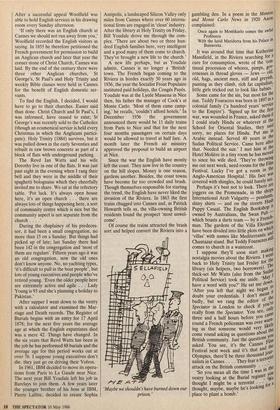WAITING FOR THE BOMBS
Dhiren Bhagat discovers
that the Riviera no longer belongs to the British
Cannes AT THE Colombe d'Or in St Paul-de- Vence my copy of Patrick Howarth's book caught the head waiter's eye. 'The Riviera that was Ours' — he repeated the book's title with deliberate incredulity — 'cheeky!' (But he seemed genuinely taken by the reproduction of Churchill's 'Riviera Landscape' on the front cover, less so by the photograph on the back cover, Queen Victoria taking tea at Nice in 1895, attended by two Indian servants.) Cheeky, but true. The Riviera was a British invention, in time became almost a British possession. In 1765 Smollett began the fashion of bathing in the sea in Nice; by 1822 the Revd Lewis Way had constructed the Promenade des Anglais and opened an Anglican church in the town. In 1835 the Lord Chancellor, Henry, Lord Brougham, unable to proceed to Nice on account of an epidemic of cholera that had broken out in Provence, bought a plot of land in the fishing village of Cannes; four years later the Italianate Villa Eleonore was com- pleted. Brougham's friendship with King Louis Philippe — who entertained the Englishman with his imitations of Danton and Robespierre — proved beneficial to the people of Cannes. He made a personal application to the King for the funds to build a harbour and 995,000 francs were promptly made available. (The annual budget of the municipality of Cannes was 29,600 francs.) The gardens of the Villa Eleonore were laid out with turf brought by boat from England and in time Brougham's gardener, a Suffolk man called John Taylor, found himself a new profession by finding properties for Brougham's English friends. (His descen- dant, Mrs Montagu, carries on the estate agency John Taylor's in the Place de la Croisette.) It was a neighbour of Brougham's who worried about the spiritual welfare of the English in Cannes. In 1847 Thomas Wool- field built a chapel in his grounds. Holding a Protestant service was not as easy. On the very first attempt, as the minister called out the numbers of the hymns the local commissioner of police aided by two gen- darmes dissolved the 'unlawful assembly'. After a successful appeal Woolfield was able to hold English services in his drawing room every Sunday afternoon.
'If only there was an English church at Cannes we should not run away from you,' Woolfield recorded the English visitors as saying. In 1855 he therefore petitioned the French government for permission to build an Anglican church and later that year the corner stone of Christ Church, Cannes was laid. By the end of the century there were three other Anglican churches, St George's, St Paul's and Holy Trinity and weekly Bible classes were held in Cannes for the benefit of English domestic ser- vants.
To find the English, I decided, I would have to go to their churches. Easier said than done. Christ Church and St Paul's, I was informed, have ceased to exist; St George's was recently sold to the Catholics (though an ecumenical service is held every Christmas in which the Anglicans partici- pate). Holy Trinity (1884) survives, but it was pulled down in the early Seventies and rebuilt in raw brown concrete as part of a block of flats with underground parking.
The Revd Ian Watts and his wife Dorothy live in one of the flats. It was just past eight in the evening when I rang their bell and they were in the middle of their spaghetti bolognaise which they cheerfully invited me to share. We sat at the refectory table. 'Pot luck. It's always open house here, it's an open church . . . there are always lots of things happening here, a sort of community centre which is nice but the community aspect is not separate from the church . . .
During the chaplaincy of his predeces- sor, it had been a small congregation, no more than 15 on a Sunday. But things had picked up of late; last Sunday there had been 142 in the congregation and 'most of them are regulars'. Fifteen years ago it was an old congregation, now the old ones don't know anyone. No, no yachting types, 'it's difficult to pull in the boat people', but lots of young executives and people who've retired young. 'Even the older people here are extremely active and agile . . . Lady Young is 93 and she's planning a holiday to Pakistan.'
After supper I went down to the vestry with a calculator and examined the Mar- riage and Death records. The Register of Burials begins with an entry for 17 April 1878; for the next five years the average age at which the English expatriates died was a mere 42. Things have changed. In the six years that Revd Watts has been in the job he has performed 88 burials and the average age for this period works out at over 76. I suppose young executives don't die, they just go on driving their Volvos.
In 1961, IBM decided to move its opera- tions from Paris to La Gaude near Nice. The next year Bill Youdale left his job in Barclays to join them. A few years later the younger brother of his boss at IBM, Pierre Lafitte, decided to create Sophia Antipolis, a landscaped Silicon Valley only miles from Cannes where over 60 interna- tional firms are engaged in 'clean' industry. After the library at Holy Trinity on Friday, Bill Youdale drove me through the com- plex. 'There are about two or three hun- dred English families here, very intelligent and a good many of them come to church. They've brought a new life to the church.'
A new life perhaps, but as Youdale admits, Cannes is no longer a 'British' town. The French began coming to the Riviera in hordes exactly 50 years ago in 1936, the year the Socialist Front Populaire instituted paid holidays, the Conges Payes. Youdale was at the Lycee Massena in Nice then, his father the manager of Cook's at Monte Carlo. 'Most of them came camp- ing,' he recalls, 'couldn't afford hotels.' In December 1936 the government announced there would be 11 daily trains from Paris to Nice and that for the next four months passengers on certain days would be allowed to travel at half fare. A month later the French air ministry approved the proposal to build an airport at Nice.
Since the war the English have mostly left the coast. They now live in the country on the hill slopes. Money is one reason, gardens another. Besides, the coast towns have become far too crowded and brash. Though themselves responsible for starting the trend, the English have never liked the invasion of the Riviera. In 1863 the first trains chugged into Cannes and, as Patrick Howarth tells us, the villa-owning British residents found the prospect 'most unwel- come'.
Of course the trains attracted the brash sort and helped convert the Riviera into a 'Maybe we shouldn't have burned down our prison.' gambling den. In a poem in the Menton and Monte Carlo News in 1920 Anon complained:
Once again to Montikarlo comes the awful Profiteera With the lurid Maridorta from his Palace in Baisworta.
It was around that time that Katherine Mansfield, in the Riviera searching for a cure for consumption, wrote of the 'con- tinual procession of whores, pimps, gov- ernesses in thread gloves — Jews — old, hags, ancient men, stiff and greyish panting as they climb, rich fat capitalists,, little girls tricked out to look like babies. Some came for the sin, but most for the sun. Teddy Fouracres was born in 1897 in 3 colonial family Ca hundred years' service , to the Empire'). 'Signed up for the firs,t war, was wounded in France, asked them I could study Hindu or whatever at the School for Oriental Studies, they said sorry, no places for Hindu. Put me in Arabic instead. Served 40 years in the Sudan Political Service. Came here after that. Needed the sun.' I met him at the Hotel Moliere in a tiny room he has moved to since his wife died. 'They're throwing me out next week, need rooms for the Pik° Festival. Lucky I've got a room in the Anglo-American Hospital.' His face was covered with shingles, he could barely see. Perhaps it's best not to look. There are joggers on the Promenade, in the shuPs International Arab Vulgarity — pendants, shiny shirts — and on the streets 11°5.11 Puppy Casual. The English Bookshop is owned by Australians, the Swan Pub 7: which boasts a darts team — by a Frene''' man. The gardens of the Villa Eleonorhe have been divided into little plots on whicd 'villas' with names like Mediterranee SO cCohmantazurstand. in a is But wTeaddtcyoFaoturacres es to church I suppose they'll soon start mak111,!, nostalgia movies about the Riviera. I back to Holy Trinity last Friday for Wee library (six helpers, two borrowers). 111 thick-set Mr Watts (also from the Sul Political Service) took me aside. May have a word with you?' He sat me dowt",; 'After you left that night we began it doubt your credentials. I don'tnlean,e badly, but we rang the editor of t,"re Spectator in London to check if Yciu really from the Spectator. You see, °11 three and a half hours before you eam round a French policeman was over ing us that someone would very come round asking us questions about t% British community. Just the questions Y.u,,„ asked. You see, it's the Cannes Fil`; Festival next week and it's that and 'I"... Olympics, there'll be three thousand nalists in Cannes. . . . They fear a terror," attack on the British community • • • ' 'So you mean all the time I was in vestry looking at the Burial register ,We thought I might be a terrorist . • • f r a thought, maybe, maybe he's looking place to plant a bomb.'



























































 Previous page
Previous page